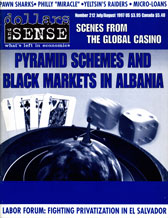Active Culture
This article is from the July/August 1997 issue of Dollars and Sense: The Magazine of Economic Justice available at http://www.dollarsandsense.org
This article is from the July/August 1997 issue of Dollars & Sense magazine.

Senior Summer
This year, some of the young activists in the Union Summer program of the AFL-CIO will work hand-in-hand with those who have already been in the forefront of organizing: retired unionists. The AFL-CIO's Senior Summer campaign intersects with five Union Summer locations: New York, Los Angeles, Miami, Seattle and Bergen County, N.J. "It seemed natural to tap into resources of retired union members. They've been through it all," says AFL-CIO spokesperson Joni Ketter.
Serving as Senior Summer's director is Rosalie Whalen from Service Employees International Union (SEIU). SEIU already has a successful retirees program, and Whalen tells us that Senior Summer will run where SEIU, Union of Needletrades, Industrial and Textile Employees (UNITE), and the United Auto Workers already have strong retiree involvement. The 50 or more Senior Summer participants at each site will mobilize other retirees through phone banks and home visits to campaign against inadequate labor laws. Cross-generational events will have Union and Senior Summer participants discussing Medicaid, Medicare, and Social Security. 1-888-8AFL-CIO.
—Lindsay Larson
Downsize the Military
As recently as 1989, New London, Conn., was the most heavily defense-dependent county in the nation. Today it is devastated by government military cutbacks. Electric Boat shipyards alone cut its local workforce from 24,000 to 14,000 with another 7,000 cuts expected.
In response, community members and local unions formed the Community Coalition for Economic Conversion (CCEC) in early 1992 to redirect "resources from military to socially useful civilian activities." Perhaps its greatest challenge has been to facilitate a cooperative, grassroots approach to economic planning in a town heavily influenced by military-style communication —and to promote a comprehensive vision of economic justice in a region that has long lobbied for defense spending as a jobs program. Nevertheless, the coalition partners are making headway.
In May, a union-commissioned report analyzing the layoffs' ripple effects on the economy was released with the support of local businesses and politicians. At the same time the coalition unveiled an "Action Plan for Jobs" that includes workshops for community members, workers and businesses to determine what their needs are; and a lobbying campaign to secure federal funding for economic conversion. The prospect of government subsidies for training in their non-military plants prompted business leaders to sign on to the campaign. But in doing so they conceded to community demands that companies receiving public assistance meet higher wage, environmental and worker rights standards. For info, call Joanne Sheehan, War Resisters League, 860-889-5337.
—Matthew Paymar
Worker Ed 101
As one way of dealing with the growing "disconnect" between unions and their members, the AFL-CIO has embarked on an "Economics Education Project." It will help interested unions hold economics workshops for the rank and file and training for shop stewards. It is also producing materials for union publications, videos and multimedia projects. All this is designed to encourage members' engagement in economic issues and, in the words of AFL-CIO Education Department head Bill Fletcher, to provide "a framework for members to understand what is going on in the world... who are their friends, who are their enemies, and the need for collective action to confront the corporate agenda."
In early June, more than 20 unions sent people to be trained as economics education facilitators.This spring the Center for Popular Economics in Amherst, Mass., and the Labor Relations and Research Center at UMASS-Amherst were busy designing manuals for the economics workshops for the rank and file. For each unit, educators will present readings, facts and figures and an interactive exercise. Unionists will discuss their own experiences, practice making economic arguments and discuss organizing strategies. The Labor Center's Eric Verhoogen calls the workshops "a book club model of learning economics."
—Alejandro Reuss
